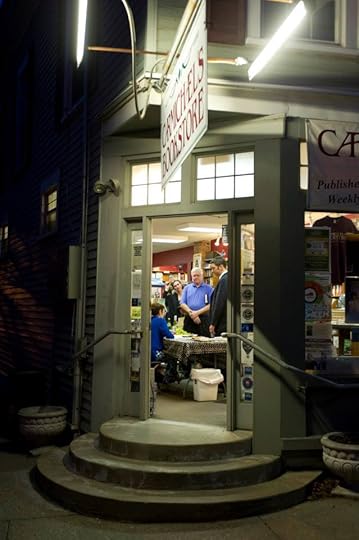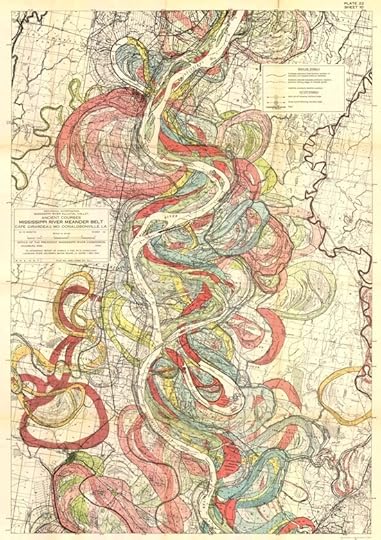“My Writing Process” blog tour
Thank you, Christine Sneed at www.christinesneed.com for involving me in this blog tour. Her Paley Prize-winning story collection Portraits of a Few of the People I’ve Made Cry and novel Little Known Facts are some of my favorite reads from the last couple of years. This 4-question relay was started by last October by Erin Albert. The way it works is: A writer invites you to answer four questions. You carry the relay forward by inviting three more writers to do the same. One person described it as “not quite a chain letter. You don’t end up with good fortune or 1,000 picture postcards from around the world or bad luck if you break the chain.” Still, I will take all the luck I can get. So here goes with my answers to the questions about work process.

At Carmichaels in Louisville KY, March 11, 2014. Photo by Robert Dorzback.
1) What are you working on now? I’m in the throes of publicity land with my debut novel, Cementville (Counterpoint, 2014), just back from a March-long book tour. Fortunately, before my pub date, I was already knee-deep in the next project, another novel. I usually have several things going at the same time, which I am not recommending. In fact I am recommending to myself right now that I stop that at once before my head explodes.
2) How does your work differ from others of its genre? My least favorite of these questions. Because however this one is answered, there’s a chance you’ll come off sounding like trying to be different is the main thing, and it really isn’t, at least for me. Whether readers subscribe to the idea that there are two basic stories, that somebody takes a trip or a stranger comes to town, I hope readers will read my work because the story and characters pull them. I will say that the two protagonists in this new text I’m working on are neither young, beautiful, hip, nor rich. Nor are they men. My agent will probably cringe as she reads this.
3) Why do you write what you do? I write fiction because it’s the one place my control-freak nature is actually an asset. My rules, in a world I make, populated by people I want to watch get into trouble.

The changing Mississippi River bed. Harold N. Fisk’s colorful drawings of rainbow ribbons reconstruct the river’s twisting path over time. I ran across these maps on Flavorwire.
4) How does your writing process work? This will sound strange after the comment above about being a control freak. But I seem to start new texts with fragments that are almost random and can feel homeless. Does this slightly freak out my inner control freak? Why yes it does, because I have to turn off critical judgment and just put down word after word, and allow space between the fragments, and wait and watch and listen. The fragments begin glomming together into something like relationships, usually between people who may have no business relating to one another. The feeling of getting that first draft is best described by referring to the lovely and somewhat horrifying drawing to the left. Only after I have the first draft do I outline, so that as I begin shifting and compressing and expanding I don’t lose track of the through lines. I do lose track of how many revisions the darn thing will go through after that first draft though. And a good thing that is, because once my agent looks at it, there’s a good chance it will go through more revision. And we aren’t even talking about what happens when my editor gets hold of it. This is when my control-freak nature has to take a back seat and I get to let my head open up even further to ways to make the manuscript the best it can be.
Thanks for stopping by and reading. Be sure to check out the writing process of a few of my favorite writers one week from today, April 14, when they post answers to these questions on their blogs.
CLIFFORD GARSTANG’S novel in stories, What the Zhang Boys Know, won the 2013 Library of Virginia Literary Award for Fiction. His first book, In an Uncharted Country, a collection of linked short stories, won the Maria Thomas Prize for fiction. His work has appeared in Bellevue Literary Review, Blackbird, Virginia Quarterly Review, Cream City Review, The Tampa Review, and elsewhere. In addition to an MA in English and a law degree, he holds an MFA in Creative Writing. He is the co-founder and editor of Prime Number Magazine and is also the editor of Everywhere Stories, a short fiction anthology that will be published later this year. Read about Cliff’s process on April 14 at: http://cliffordgarstang.com
EMILY GRAY TEDROWE is the author of Commuters: a novel (Harper Perennial) which was named a Best New Paperback by Entertainment Weekly. Her short fiction has been published in the Chicago Tribune’s Printers Row Journal, Fifty-Two Stories, and Other Voices. Her new novel, Blue Stars, was conceived during her brother’s Marine service in the Iraq war, and is forthcoming from St. Martin’s Press. Originally from New York City, Emily now lives in Chicago with her husband and daughters. Read about Emily’s writing process on April 14 at her site: www.egtedrowe.tumblr.com
PATRICIA GRACE KING grew up in North Carolina and spent years in Spain and Guatemala. She holds an MFA from Warren Wilson College and a Ph.D. in English from Emory University. Her stories appear or are forthcoming in Ploughshares, Narrative Magazine, Nimrod, and other journals. Her chapbooks, The Death of Carrie Bradshaw and Rubia, won the Kore Press Short Fiction and the Jeanne Leiby Memorial contests, respectively. She is the recipient of a Pushcart Prize nomination and a fiction fellowship from the Vermont Studio Center. She is the 2013-2014 Carol Houck Smith Fellow at the Wisconsin Institute for Creative Writing and lives in the Printers Row neighborhood of Chicago with her husband. On April 14 Patricia will answer the questions at her site: www.patriciagraceking.com
Paulette Livers at GoodReads
- Paulette Livers's profile
- 40 followers



